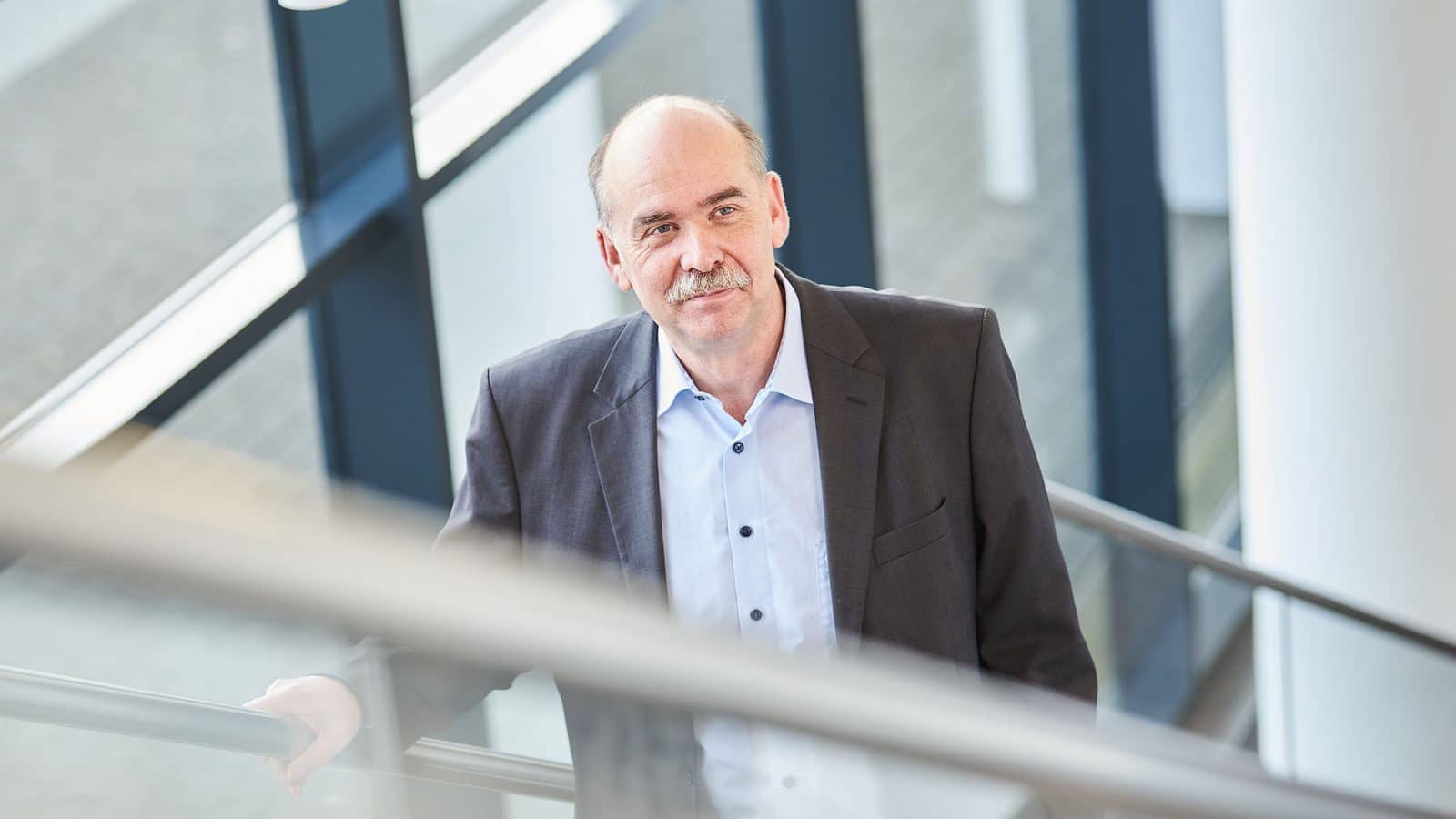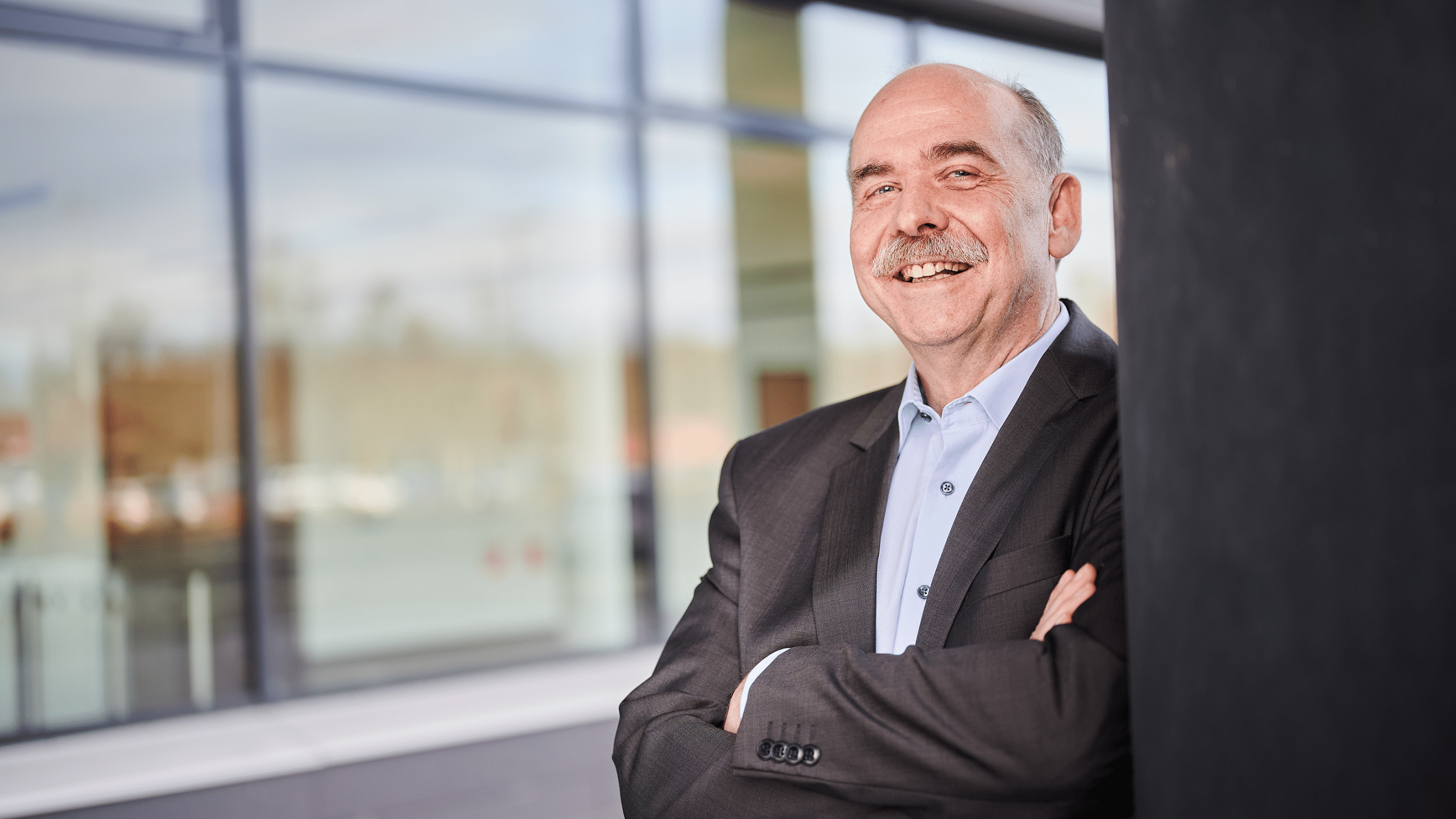“No sustainability, no commercial success”
Michael Träxler is convinced that nothing will function in future if sustainability is not part of the equation. An interview with the Head of the Evonik Active Oxygens Business Line about chemistry and sustainability, personal commitment, and his messages to employees.
Mr. Träxler, why is sustainability so important to Evonik Active Oxygens?
Michael Träxler: We regard four points as being particularly important. First, the “end of life” issue plays a major role in sustainability. What happens to a product at the end of its life cycle? The chemical industry and other industries are struggling here. It’s great news in our case, because hydrogen peroxide degrades into water and oxygen at the end, and peracetic acid also degrades into acetic acid — in other words, into nothing but unpolluted substances. That’s why we have no “end of life” problems.
There is an incredibly large number of applications, such as food, electronics, water treatment or medical technology, for hydrogen peroxide, peracetic acid and persulfates. These are all industries in which global megatrends are bringing about massive change. This also applies to green space travel, chemical synthesis or the large paper segment. It’s all about the handprint: how can our products contribute to increasing sustainability in each segment? That is my second key point.
My third point is: there are only a few industries that have a CO2 neutrality roadmap like we do. We are aware that this journey will not be easy and will cost many hundreds of millions of euros in investment. But in the case of hydrogen peroxide, for example, what ultimately matters is having sustainability paths for hydrogen, electricity and steam respectively — and all of those exist.

A roadmap is one thing. But what is technically feasible right now?
It’s no longer a question of how. In technology terms, the issue has been resolved: we already have green electricity, and in fact we already use more than 80 percent green electricity at our production sites worldwide. I can obtain green hydrogen if I have enough green electricity. That’s the big issue in industry right now, but it’s technically feasible. And as far as steam is concerned, what matters is generation using renewable energies and reducing consumption. I am pleased that we at Evonik Active Oxygens have already sketched out a concrete roadmap to take us to CO2 neutrality. That is fantastic.
Those are my three main arguments. My fourth is that demand for hydrogen peroxide is growing worldwide by seven to eight percent a year, driven by high demand in growth segments like food or electronics. This presents us with particular challenges. If we do nothing, our CO2 emissions will double every nine years — and that must not be allowed to happen.
The acquisition of PeroxyChem has now massively increased CO2 emissions. Nevertheless, Evonik Active Oxygens will help the Group achieve its climate targets in the future. How does that work?
The acquisition of PeroxyChem is a major boost, not only to sales and earnings, but also in terms of CO2 emissions. But we are well on track — for example, in addition to green electricity, we are also switching from fossil-based acetic acid to bio-based acetic acid.
We have just started a major investment project, the aim of which is to increase our own production efficiency. For example, how do we reduce electricity or water consumption? Despite a massive increase in production volumes, our CO2 emissions are falling, because we are taking countermeasures – and because we started in good time.
Megatrends are a worldwide phenomenon. Does that also apply to sustainability?
To start with, sustainability was a European topic — especially when Donald Trump was president of the USA. In the meantime, sustainability has also become much more important in other regions, especially in North America. But regional, and in some cases even local, differences remain, of course. Compared to our, we at Evonik Active Oxygens were among the earliest to start championing the issue of sustainability. Speed matters — not just as far as sustainability is concerned. We have to be fast without losing sight of safety. The same applies to our customers around the world.
How important is it to form strategic alliances with partners in order to maintain this speed?
Collaborative ventures with customers and partners are important. We analyze challenges of the future together. We cannot solve problems only when they arise. We have to ask this question now. What is likely to happen in 2030? What is likely to happen in 2040? And what is likely to happen in 2050? What will we have the confidence to undertake in which region with which partner by what date?
Sustainability has three dimensions: environmental, economic and social. How does that tally with economic sustainability, if massive investments have to be made to take account of the environmental dimension?
They are two sides of the same coin. In my view, commercial success is completely unachievable, if we don’t manage to make some headway with establishing a sustainability architecture. Our customers demand it, our current and future employees demand it. And focusing on sustainability is essential for our survival as a company.
What role do your employees play in the objective of becoming more sustainable as a company?
Our primary objective – which takes precedence over any financial issues – is that our employees feel comfortable working with us and that they are safe. Everyone should go home in the evening in the same state as when they arrived in the morning – mentally even in a better place, because we really enjoy what we do. The same applies figuratively to sustainability. We have a responsibility to see that the world remains in a state that everyone can enjoy. We at Evonik Active Oxygens alone won’t save the world, but everyone has to play their part, no matter how small.
Now some people say chemistry and sustainability aren’t really compatible …
We have to be honest here and say: yes, we embody chemistry. Chemistry generally has an image problem, and mistakes have been made in the past. On the other hand, there can be no transformation without chemistry — no car battery, no wind power, no appropriate building insulation.
Hydrogen peroxide is also chemistry. But hydrogen peroxide also occurs in the human body, in nature. When it rains after a thunderstorm, hydrogen peroxide is found in grasslands. Hydrogen peroxide is found in honey, in roasted coffee. It’s a green, natural product that we don’t have to be afraid of.
My message to our employees is: you will only have long-term job security, if you work in an industry that has a future. And we need chemistry, otherwise there will be no progress.
The big-picture objective is one thing, but what about tangible measures on the ground? For example, doing away with disposable cups …
… or motion detectors everywhere, so that you don’t consume unnecessary electricity. We have installed motion detectors at many of our sites, most recently in New Zealand. If there’s a windmill in Antwerp or solar panels on the roof in New Zealand and in the future in South Africa, people see that. We also have solar panels here in Hanau.
Minor details also play a role. Does the room temperature have to be 23 degrees Celsius in winter or are 20 enough? How do I ventilate properly? Topics like that.
Are you yourself a role model championing more sustainability? What are you doing?
Our candidates for the Federal Chancellorship were also asked a similar question. I think the honest answer from all of them should have been, and that goes for me, too: not enough.
I, for example, believe 20 degrees Celsius room temperature in winter is sufficient. If I get cold, I put on a sweater. Every degree less reduces electricity consumption. And I also pay attention to other things, such as nutrition. I can’t do without meat altogether. But I do try to eat locally produced food.
We have not yet got to where we are supposed to be. We all have to put in a great deal of effort to get there. But I hope that some people — and I would claim that for myself as well — have realized that things cannot go on as they have in the past few decades. You can try to be a role model, but that’s no trivial matter.
It’s clear how close to your heart this topic is. Why is sustainability a concern for you personally?
Sustainability is not just about footprints and handprints, sustainability is more. And that’s why I like working at Evonik. It’s the culture and the concept of social skills that a company or a division has. Big issues like co-determination, social benefits, and other standards apply globally at our company, including occupational safety and environmental protection.
The second point that really motivates me, and this is my firm belief: sustainability is the nucleus, the focus, the basis of everything we do. Sustainability is the starting point for everything, and without sustainability, nothing at all will function in the future. Everything else revolves around it — business success and decent jobs for our employees. That’s what I want to promote — internally and externally.
We would have easily achieved better results last year, if we hadn’t switched our electricity “to green”. But in the end, these are the things that matter. And in that respect, we have to get our people on board. It is a matter of personal concern to me that we make further progress here. This has to do with common decency and attitude. By living up to our own values and being responsible toward our employees.
